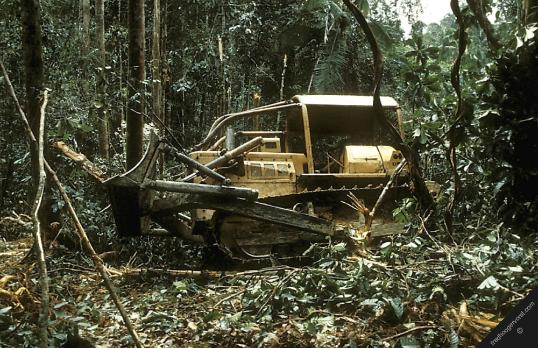
The War against the Trees
The man who sold his lawn to standard oil
Joked with his neighbors come to watch the show
While the bulldozers, drunk with gasoline,
Tested the virtue of the soil
Under the branchy sky 5
By overthowing first the privet-row. Forsythia-forays and hydrangea-raids
Were but preliminaries to a war
Against the great-grandfathers of the town,
So freshly lopped and maimed. 10
They struck and struck again,
And with each elm a century went down.
All day the hireling engines charged the trees,
Subverting them by hacking underground
In grub-dominions, where dark summer’s mole 15
Rampages through his halls,
Till a northern seizure shook
Those crowns, forcing the giants to their knees.
I saw the ghosts of children at their games
Racing beyond their childhood in the shade, 20
And while the green world turned its death-foxed
page
And a red wagon wheeled,
I watched them disappear
Into the suburbs of their grievous age.
Ripped from the craters much too big for hearts 25
The club-roots bared their amputated coils,
Raw gorgons matted blind, whose pocks and scars
Cried Moon! On a corner lot
One witness-moment, caught
In the rear-view mirrors of the passing cars. 30
Commentary:
The above poem, “The War against the Trees,” is a great reflection of the themes and ideas that reoccur in much of Stanley Kunitz’s work. Nature, life, and death, particularly, and the feeling of being isolated and remote from others (especially when there is a depth of feeling involved), seem to show up again and again in his poetry.
In this particular poem, the speaker is watching bulldozers strip the land of its plants and trees and tear up the ground in the search for oil. All of the other onlookers (represented in the characters of the man and his neighbors) don’t seem to be bothered by the war being waged on nature; only the speaker is disturbed.
The reason I chose this poem from the collection is that it really seems to show Kunitz’s skill with language and imagery. For instance: “While the bulldozers, drunk with gasoline, / Tested the virtue of the soil.” Kunitz seems to be equating the bulldozers with a rowdy, drunken army that has set out to rape (“Tested the virtue of the soil”), maim, and kill the land and its inhabitants. This enemy continues its assaults (mentioned in army terminology), heading toward the ultimate goal – the ancient trees, which, for the speaker, stand as monuments to all of the history there.
Kunitz then brings the poem full-circle: while this ‘war’ was started in search of oil, in the end, the destruction is seen only in the rear-view mirrors of passing motorists.